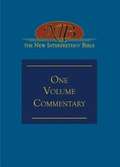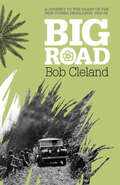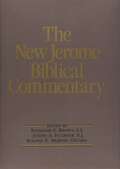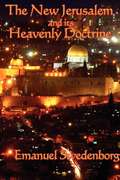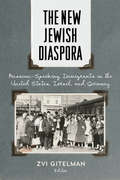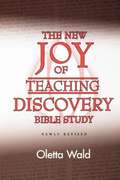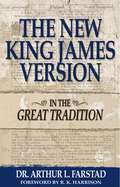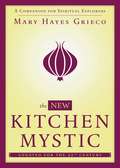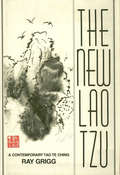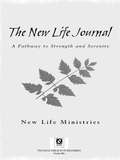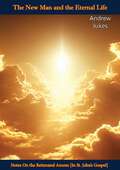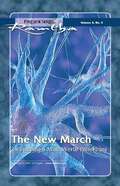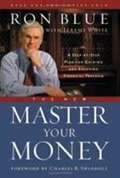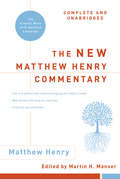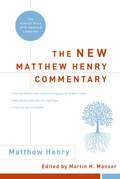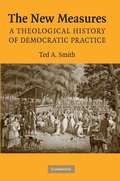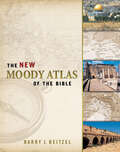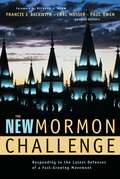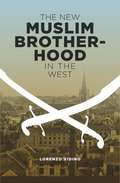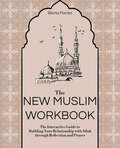- Table View
- List View
The New Interpreter's® Bible One-Volume Commentary: One-volume Commentary
by Beverly Roberts Gaventa and David PetersenPastors and students who want a one-volume commentary to complement the New Interpreter's Study Bible will be pleased to find in this resource the quality of scholarship that is a hallmark of other New Interpreter's Bible resources. The portability, accessibility, and affordability of the one-volume commentary will appeal to professors and students as well as lay persons and pastors. This commentary contains articles on all the books of the Bible, including the Apocrypha, as well as numerous general articles on biblical interpretation, geographical and historical setting, religion, text, canon, translation, Bible and preaching/teaching, with bibliographies for each article. Extra value includes: chronology/timeline, table of measures and money, and a subject index. Old Testament Editor: Dr. David L. Petersen, Franklin Nutting Parker Professor of Old Testament, Emory University. Professor Petersen's current research focuses on the book of Genesis and on prophetic literature. An ordained Presbyterian minister, Dr. Petersen has written, coauthored, or coedited a number of scholarly and popular books and articles. He was the senior Old Testament editor for The New Interpreter's Bible. Professor Petersen is a past president of the Society of Biblical Literature.New Testament Editor: Dr. Beverly Roberts Gaventa, Helen H.P. Manson Professor of New Testament Literature and Exegesis, Princeton Theological Seminary. Dr. Gaventa, whose specialties within the field of New Testament are the letters of Paul and Luke-Acts, is widely published. She is a member of the advisory board for the New Testament Library, a new commentary series for Westminster John Knox Press; editor of the Society of Biblical Literature’s Resources for Biblical Studies and a member of the editorial board of its Journal of Biblical Literature; and associate editor of the Catholic Biblical Quarterly.
The New Interpreter's® Handbook of Preaching
by Bob ClelandThe New Interpreter’s Handbook of Preaching is a major reference tool for preaching, with articles on every facet of Christian sermon preparation and delivery. This resource is both scholarly and practical. It focuses on the most distinctive feature and greatest strength of homiletics as a discipline: It is rooted in interdisciplinary scholarship and it develops theory geared to practice. Its theory arises out of the study of both excellent preaching past and present and actual sermon preparation and composition. When theory and practice critique each other, it is possible to produce guidelines that assist greater excellence and economy in preaching the gospel. Excellence in standards is an area in which homiletics needs to grow, and this project will be both a means to encourage and develop it. A guiding question throughout will be, Will it preach? The answers will be offered in the sense that “here is something that works well,” rather than “here is something to try.”Preachers will turn to this resource with the expectation that they will find scholarly treatment of topics, brief bibliographies of relevant key books and articles, along with practical methodological suggestions for preachers to employ. The contributors are homileticians, preachers, and writers in various disciplines who are committed to the pulpit through practice.
The New Jerome Biblical Commentary
by Joseph A. Fitzmyer Raymond Edward Brown Ronald E. Murphy Roland Edmund MurphyThis contemporary verse by verse commentary examines the scientific, literary, and historical content of the Scriptures — reflecting the exegetical variation found within the community of scholars. Features current theories on dating, historical reconstruction, and archaeological information. Provides contemporary perspectives on hermeneutics, theological depths relating to the biblical word, and themes in the Old Testament. Includes articles on Jesus, the Early Church, Gnosticism, and the subapostolic church.
The New Jerusalem and Its Heavenly Doctrine
by Emanuel SwedenborgA wonderful introduction to the beliefs of the New Church and an overview of its theological foundations. Here Emanuel Swedenborg discusses faith, love, goodness and truth, heaven and hell, divine providence, the holy sacraments, and much, much more. For those wishing to explore the writings of Emanuel Swedenborg this is a perfect starting place.
The New Jewish Diaspora: Russian-Speaking Immigrants in the United States, Israel, and Germany
by Zvi Gitelman Mikhail Krutikov Stephanie Sandler Anna Shternshis Sveta Roberman Uzi Rebhun Jonathan Dekel-Chen Adrian Wanner Nelly Elias Steven J. Gold Mark Tolts Hannah Pollin-Galay Julia Lerner Marina Sapritsky Elena Nosenko-Shtein Olena Bagno-Moldavski Eliezer Ben-Rafael Gur Ofer Yaacov Ro'IIn 1900 over five million Jews lived in the Russian empire; today, there are four times as many Russian-speaking Jews residing outside the former Soviet Union than there are in that region. The New Jewish Diaspora is the first English-language study of the Russian-speaking Jewish diaspora. This migration has made deep marks on the social, cultural, and political terrain of many countries, in particular the United States, Israel, and Germany. The contributors examine the varied ways these immigrants have adapted to new environments, while identifying the common cultural bonds that continue to unite them. Assembling an international array of experts on the Soviet and post-Soviet Jewish diaspora, the book makes room for a wide range of scholarly approaches, allowing readers to appreciate the significance of this migration from many different angles. Some chapters offer data-driven analyses that seek to quantify the impact Russian-speaking Jewish populations are making in their adoptive countries and their adaptations there. Others take a more ethnographic approach, using interviews and observations to determine how these immigrants integrate their old traditions and affiliations into their new identities. Further chapters examine how, despite the oceans separating them, members of this diaspora form imagined communities within cyberspace and through literature, enabling them to keep their shared culture alive. Above all, the scholars in The New Jewish Diaspora place the migration of Russian-speaking Jews in its historical and social contexts, showing where it fits within the larger historic saga of the Jewish diaspora, exploring its dynamic engagement with the contemporary world, and pointing to future paths these immigrants and their descendants might follow.
The New Joy Of Teaching Discovery In Bible Study (Kids And Christian Education Series)
by Oletta WaldConcentrating on how to teach Bible studies, this resource covers preparation and roles as well as how to work with the learner to create a mutually beneficial learning experience. Get a step-by-step approach to looking at different aspects of the study. The focus is on observation, interpretation, and evaluation. One per leader.
The New King James Version: In the Great Tradition
by Arthur L. FarstadIn 1975, the boldest, most extensive project in modern Bible publishing history began. 130 Bible scholars, pastors and communicators gathered with one goal in mind - to preserve the accuracy, authority and beauty of the King James Version while updating the language for modern readers. This book offers an insightful glance into the history of this event as only the Executive Editor, Arthur L. Farstad can tell. If you've ever thought that a room full of biblical scholars sorting through Hebrew and Greek was boring, then think again. Revealing the pain staking progress that each member of the committee made over the seven-year process, three distinct sections guide the reader through the purpose of the NKJV translation: Part One: Accuracy Part Two: Beauty Part Three: Completeness
The New Kitchen Mystic
by Mary Hayes GriecoFilled with timeless insights and poignant personal stories, The New Kitchen Mystic offers healing words of wisdom about enlightenment, fulfillment, and hope.Written in the tradition of Rachel Naomi Remen's Kitchen Table Wisdom and Ann Morrow Lindbergh's Gifts from the Sea, The New Kitchen Mystic is the perfect companion for anyone on a journey of self-healing, personal illumination, or purposeful world service. Drawing from real life stories, this instructional collection of essays is part philosophy, part how-to, and part storytelling. You'll learn how to engage spiritually and cultivate love, peace, and creativity. You'll also learn that anything and everything we do in our daily lives can become a spiritual practice. A perennial, inspirational guide for hope and healing, The New Kitchen Mystic is the perfect companion book to Grieco's previous work, Unconditional Forgiveness. Whether it's a gift or for you or someone you love, The New Kitchen Mystic is sure to be a beloved classic for any spiritual seeker.
The New Lao Tzu
by Ray GriggA new interpretation of the Tao Te Ching, this book is a celebration of the Way of Harmony and Balance. Ray Grigg transforms what has been traditionally called the Tao Te Ching, what he calls the Lao Tzu, from the mysterious to the meaningful. He accomplishes this by abandoning the historical convention of a literal reading of the Chinese texts. The result is a poetic expression of ancient wisdom in a language that readers can approach directly. The wisdom of the Lao Tzu rests in its ability to tease confusion into insight that is beyond the confinement of intellectual understanding. Beautifully illustrated with ink drawings by Bill Gaetz, The New Lao Tzu demonstrates that living the wisdom of the Lao Tzu requires more instinct than reason, more intuition than argument.
The New Lao Tzu
by Ray GriggA new interpretation of the Tao Te Ching, this book is a celebration of the Way of Harmony and Balance. Ray Grigg transforms what has been traditionally called the Tao Te Ching, what he calls the Lao Tzu, from the mysterious to the meaningful. He accomplishes this by abandoning the historical convention of a literal reading of the Chinese texts. The result is a poetic expression of ancient wisdom in a language that readers can approach directly. The wisdom of the Lao Tzu rests in its ability to tease confusion into insight that is beyond the confinement of intellectual understanding. Beautifully illustrated with ink drawings by Bill Gaetz, The New Lao Tzu demonstrates that living the wisdom of the Lao Tzu requires more instinct than reason, more intuition than argument.
The New Life Journal
by Thomas NelsonThe New Life Journal helps you to begin. Not only will this beautifully designed book inspire you to put pen to paper, it will provide the tools you need to work through your feelings. Each section explores a different emotion such as fear, loneliness, despair, and depression. Thought-provoking questions will help you write about your deepest hurts and fears and replace those negative feelings with love, courage, forgiveness, compassion, and peace.
The New Man and the Eternal Life: Notes On The Reiterated Amens [in St. John's Gospel]
by Andrew Jukes"The New Man and the Eternal Life: Notes on the Reiterated Amens [In St. John's Gospel]" by Andrew Jukes offers an in-depth and thought-provoking exploration of the profound truths contained within the Gospel of John. Jukes, a renowned theologian and biblical scholar, meticulously examines the significance of the repeated "Amen, Amen" statements made by Jesus throughout this Gospel, unveiling their deep spiritual and theological implications.In this insightful work, Jukes delves into the unique structure and message of the Gospel of John, focusing on how the reiterated "Amens" serve as emphatic affirmations of key teachings about the nature of Christ, the new life He offers, and the promise of eternal life. Each chapter of the book addresses a different "Amen, Amen" statement, providing a detailed analysis of its context, meaning, and relevance for believers.Jukes' scholarly yet accessible approach allows readers to grasp the intricate connections between these statements and the overarching themes of the Gospel. He elucidates how these affirmations underscore the transformative power of Christ's message, the reality of the new birth, and the eternal life that comes through faith in Him. Through his careful exegesis, Jukes highlights the enduring relevance of these teachings for contemporary Christians seeking a deeper understanding of their faith."The New Man and the Eternal Life" is not only a theological study but also a devotional work that encourages personal reflection and spiritual growth. Jukes' profound insights invite readers to contemplate the profound mystery of the new life in Christ and to embrace the assurance of eternal life promised in the Gospel.This book is an invaluable resource for theologians, biblical scholars, and any believer looking to deepen their understanding of the Gospel of John. Andrew Jukes' "The New Man and the Eternal Life" offers a rich and enlightening journey into the heart of one of the most beloved books of the New Testament, revealing the timeless truths that continue to inspire and transform lives.
The New March: Developing a Mind Worth Preserving (Fireside (New Leaf/JZK))
by Ramtha&“There are viruses that are intelligent that can change so fast. You don&’t change but they do. They are the host that is going to feed upon what is not going to change and they are going to destroy you. How do you then prepare for a marching army that is silent, quiet, deceptive, and invisible? You have to be beings whose consciousness is so clean that there is no environment for such an army to march upon. That is the only way you are going to survive what is about to happen to the West.&” - Ramtha
The New Master Your Money: A Plan For Gaining And Enjoying Financial Freedom
by Ron BlueDo you know if you have enough? Do you know how much is enough? If you can't answer these questions, Master Your Money is for you. In this book, Ron Blue extracts principles from God's Word and applies them to your financial portfolio. Learn how to: Avoid the most common financial mistakes Apply biblical principles for money management Save, invest, and give wisely Create a long-term financial plan that works Plan for your taxes and estate needs Get out of debt Ron's professional experience in financial planning will ease your anxieties over money and be an asset to you and your family for generations to come. Learn the tools and techniques you need to move forward toward true financial freedom. This new edition includes important updates and new content, making it timely and relevant.
The New Matthew Henry Commentary: Complete and Unabridged
by Matthew Henry Martin H. ManserMatthew Henry (1662-1714) was a Presbyterian minister in England who began his commentary on the Bible in 1704. He completed his work up to the end of Acts before his death. Afterwards, his ministerial friends completed the work from Henry’s notes and writings. Time has sealed the reputation of Matthew Henry’s classic commentary as a rich source of insight into God’s word. For nearly 300 hundred years, Christian have consulted its rich insights into the very heart of God’s Word. Passage by passage, its prayerful, penetrating reflections inspire and challenge the reader. And now, in the tradition of the updated versions of Streams in the Desert and My Utmost for His Highest, the New Matthew Henry Commentary updates the language of the original, making it much easier to understand, while retaining its beauty and strong content. This one volume contains a wealth of exposition and comment, metaphors, analogies, and illustrations that have set Matthew Henry’s Commentary apart as one of the enduring legacies of faith. Ideal for personal devotions, Bible study, sermon and lesion preparations. Forever fresh and never failing to render new pearls of wisdoms, it’s a book you will reach for often to obtain deeper understanding of the Scriptures. Abridged and unabridged editions.
The New Matthew Henry Commentary: The Classic Work with Updated Language
by Matthew Henry Martin H. ManserA classic commentary in modern language … this volume contains the wealth of exposition, metaphors, analogies, and illustrations that have set Matthew Henry’s Commentary apart as one of the enduring legacies of faith—and presents them in the language of today. Passage by passage, its prayerful, penetrating reflections and rich insights into the very heart of God’s Word are sure to challenge and inspire you. Ideal for personal devotions, Bible studies, and lesson and sermon preparations, The New Matthew Henry Commentary will enable you to rediscover this classic work—or discover it for the first time. Forever fresh and never failing to render new pearls of wisdom, this beloved text is one that you will reach for often to obtain deeper understanding of and appreciation for the Scriptures.
The New Measures: A Theological History of Democratic Practice
by Ted A. SmithCombining histories of performance, space, institutions, and ideas, the book tells the story of the 'new measures' that circulated in the religious revivals of the 1820s and '30s.
The New Middle Ages
by Jerold C. FrakesBroadens the perspective of recent work on the discourse of the Muslim Other in medieval Christendom by investigating pertinent texts, art, and artefacts, situating these local discourses of the Muslim Other in the larger cultural context of proto-Eurocentric discourse.
The New Moody Atlas of the Bible
by Barry J. BeitzelThe Moody Atlas of Bible Lands integrates the geography of Bible lands with the teachings of the Bible. Its one hundred thousand words provide useful commentary for more than ninety detailed maps of Palestine, the Mediterranean, the Near East, the Sinai, and Turkey. Learn of God's protection and guidance by following Israel's forty-year sojourn in the wilderness. Appreciate the results of the Great Commission to 'teach all nations' by seeing the scope of Paul's three missionary journeys. Dr. Barry Beitzel has blended the topographical and historical in multi-colored maps that accurately reflect evangelical Christianity. Pages of timeless information aid in sermon preparation and in personal Bible study. The Moody Atlas of Bible Lands is an invaluable asset to Sunday school teachers and to seminary and Bible college students. Text and unique maps make this one of the most useful and accurate atlases available today.
The New Moody Atlas of the Bible
by Barry J. BeitzelThe Moody Atlas of Bible Lands integrates the geography of Bible lands with the teachings of the Bible. Its one hundred thousand words provide useful commentary for more than ninety detailed maps of Palestine, the Mediterranean, the Near East, the Sinai, and Turkey. Learn of God's protection and guidance by following Israel's forty-year sojourn in the wilderness. Appreciate the results of the Great Commission to 'teach all nations' by seeing the scope of Paul's three missionary journeys. Dr. Barry Beitzel has blended the topographical and historical in multi-colored maps that accurately reflect evangelical Christianity. Pages of timeless information aid in sermon preparation and in personal Bible study. The Moody Atlas of Bible Lands is an invaluable asset to Sunday school teachers and to seminary and Bible college students. Text and unique maps make this one of the most useful and accurate atlases available today.
The New Mormon Challenge: Responding to the Latest Defenses of a Fast-Growing Movement
by Francis J. Beckwith Richard J. Mouw Carl Mosser Paul OwenCurrent facts about Mormonism •Over 11 million members. •Over 60,000 full-time missionaries—more than any other single missionary-sending organization in the world. •More than 310,000 converts annually. •As many as eighty percent of converts come from Protestant backgrounds. (In Mormon circles, the saying is, “We baptize a Baptist church every week.”) •Within fifteen years, the numbers of missionaries and converts will roughly double. •Within eighty years, with adherents exceeding 267 million, Mormonism could become the first world-religion to arise since Islam. You may know the statistics. What you probably don’t know are the advances the Church of Jesus Christ of Latter-day Saints (LDS) is making in apologetics and academic respectability. With superb training, Mormon scholars outclass many of their opponents. Arguments against Mormon claims are increasingly refuted as outdated, misinformed, or poorly argued. The New Mormon Challenge is a response to the burgeoning challenge of scholarly Mormon apologetics. Written by a team of respected Christian scholars, it is free of caricature, sensationalism, and diatribe. The respectful tone and responsible, rigorous, yet readable scholarship set this book in a class of its own. The New Mormon Challenge recycles no previous material and duplicates no one’s efforts. Instead, responding to the best LDS scholarship, it offers freshly researched and well-documented rebuttals of Mormon truth claims. Most of the chapter topics have never been addressed, and the criticisms and arguments are almost entirely new. But The New Mormon Challenge does not merely challenge Mormon beliefs; it offers the LDS Church and her members ways to move forward. The New Mormon Challenge will help you understand the intellectual appeal of Mormonism, and it will reveal many of the fundamental weaknesses of the Mormon worldview. Whether you are sharing the gospel with Mormons or are investigating Mormonism for yourself, this book will help you accurately understand Mormonism and see the superiority of the historic Christian faith. Outstanding scholarship and sound methodology make this an ideal textbook. The biblical, historical, scientific, philosophical, and theological discussions are fascinating and will appeal to Christians and Mormons alike. Exemplifying Christian scholarship at its best, The New Mormon Challenge pioneers a new genre of literature on Mormonism. The Editors Francis J. Beckwith (Ph.D., Fordham University), Carl Mosser (Ph.D. candidate, University of St. Andrews), and Paul Owen (Ph.D., University of Edinburgh) are respected authorities on the Church of Jesus Christ of Latter-day Saints and the authors of various books and significant articles on Mormonism. Their individual biographies as well as information on the book’s contributors appear inside. With contributors including such respected scholars as Craig L. Blomberg, William Lane Craig, J. P. Moreland, and others, The New Mormon Challenge is, as Richard Mouw states in his foreword, “an important event for both Protestant evangelicals and Mormons” that models “to the evangelical community what it is like to engage in respectful and meaningful exploration of a viewpoint with which we disagree on key points.” “In recent years, Mormon scholars have produced a body of literature that has been largely ignored by evangelicals. This current volume takes a giant step forward in correcting this oversight in a way that is both intellectually vigorous, yet respectful.” —Ken Mulholland, President, Salt Lake Theological Seminary “Intellectually serious evangelical responses to the faith of the Latter-day Saints have been depressingly rare. This book represents a significant contribution to a conversation that, really, has just begun.” —Daniel Peterson, Brigham Young University; Foundation for Ancient Research and Mormon Studies (FARMS) “Finally we have a book from evangelicals in which the authors have made
The New Muslim Brotherhood in the West
by Lorenzo VidinoIn Europe and North America, networks tracing their origins back to the Muslim Brotherhood and other Islamist movements have rapidly evolved into multifunctional and richly funded organizations competing to become the major representatives of Western Muslim communities and government interlocutors. Some analysts and policy makers see these organizations as positive forces encouraging integration. Others cast them as modern-day Trojan horses, feigning moderation while radicalizing Western Muslims. Lorenzo Vidino brokers a third, more informed view. Drawing on more than a decade of research on political Islam in the West, he keenly analyzes a controversial movement that still remains relatively unknown. Conducting in-depth interviews on four continents and sourcing documents in ten languages, Vidino shares the history, methods, attitudes, and goals of the Western Brothers, as well as their phenomenal growth. He then flips the perspective, examining the response to these groups by Western governments, specifically those of Great Britain, Germany, and the United States. Highly informed and thoughtfully presented, Vidino's research sheds light on a critical juncture in Muslim-Western relations.
The New Muslim Brotherhood in the West (Columbia Studies in Terrorism and Irregular Warfare)
by Lorenzo VidinoIn Europe and North America, networks tracing their origins back to the Muslim Brotherhood and other Islamist movements have rapidly evolved into multifunctional and richly funded organizations competing to become the major representatives of Western Muslim communities and government interlocutors. Some analysts and policy makers see these organizations as positive forces encouraging integration. Others cast them as modern-day Trojan horses, feigning moderation while radicalizing Western Muslims. Lorenzo Vidino brokers a third, more informed view. Drawing on more than a decade of research on political Islam in the West, he keenly analyzes a controversial movement that still remains relatively unknown. Conducting in-depth interviews on four continents and sourcing documents in ten languages, Vidino shares the history, methods, attitudes, and goals of the Western Brothers, as well as their phenomenal growth. He then flips the perspective, examining the response to these groups by Western governments, specifically those of Great Britain, Germany, and the United States. Highly informed and thoughtfully presented, Vidino's research sheds light on a critical juncture in Muslim-Western relations.
The New Muslim Workbook: The Interactive Guide to Building Your Relationship with Allah through Reflection and Prayer
by Bisma ParvezA Simon & Schuster eBook. Simon & Schuster has a great book for every reader.
The New Muslims of Post-Conquest Iran
by Sarah Bowen SavantHow do converts to a religion come to feel an attachment to it? The New Muslims of Post-Conquest Iran answers this important question for Iran by focusing on the role of memory and its revision and erasure in the ninth to eleventh centuries. During this period, the descendants of the Persian imperial, religious, and historiographical traditions not only wrote themselves into starkly different early Arabic and Islamic accounts of the past but also systematically suppressed much knowledge about pre-Islamic history. The result was both a new "Persian" ethnic identity and the pairing of Islam with other loyalties and affiliations, including family, locale, and sect. This pioneering study examines revisions to memory in a wide range of cases, from Iran's imperial and administrative heritage to the Prophet Muhammad's stalwart Persian companion, Salman al-Farisi, and to memory of Iranian scholars, soldiers, and rulers in the mid-seventh century. Through these renegotiations, Iranians developed a sense of Islam as an authentically Iranian religion, as they simultaneously shaped the broader historiographic tradition in Arabic and Persian.
